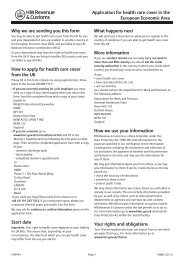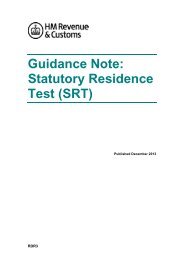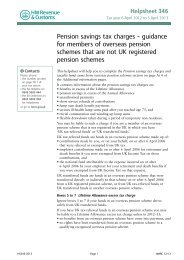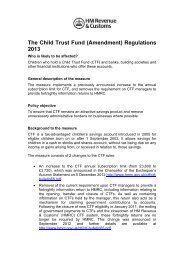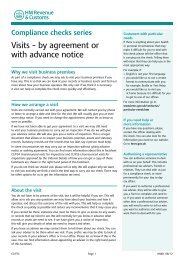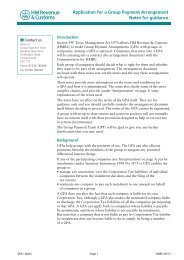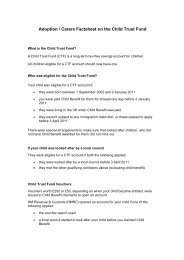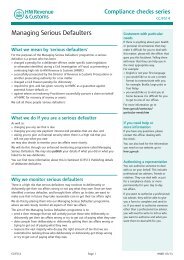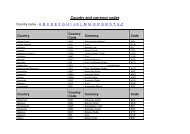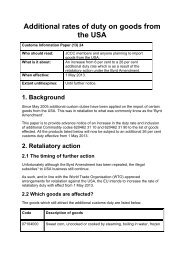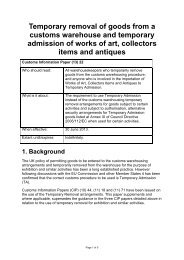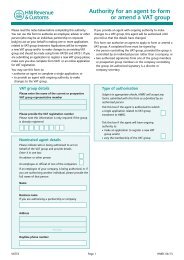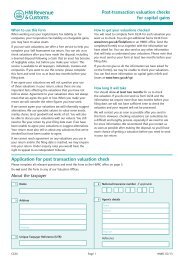IHT400 Notes : Guide to completing your Inheritance Tax account
IHT400 Notes : Guide to completing your Inheritance Tax account
IHT400 Notes : Guide to completing your Inheritance Tax account
Create successful ePaper yourself
Turn your PDF publications into a flip-book with our unique Google optimized e-Paper software.
Your rights and<br />
obligations<br />
If you have<br />
a complaint<br />
How we use <strong>your</strong><br />
information<br />
Confidentiality<br />
80<br />
<strong>IHT400</strong> <strong>Notes</strong><br />
<strong>Guide</strong> <strong>to</strong> <strong>completing</strong> <strong>your</strong> <strong>Inheritance</strong> <strong>Tax</strong> <strong>account</strong><br />
More information<br />
Your Charter explains what you can expect from us and what we expect<br />
from you. For more information go <strong>to</strong> www.hmrc.gov.uk/charter<br />
For information about our complaints procedures go <strong>to</strong> www.hmrc.gov.uk<br />
and look for Complaints within the Search facility.<br />
Data Protection Act<br />
HM Revenue & Cus<strong>to</strong>ms is a Data Controller under the Data Protection<br />
Act 1998. We hold information for the purposes specified in our<br />
notification <strong>to</strong> the Information Commissioner, including the assessment and<br />
collection of tax and duties, the payment of benefits and the prevention<br />
and detection of crime, and may use this information for any of them.<br />
We may get information about you from others, or we may give<br />
information <strong>to</strong> them. If we do, it will only be as the law permits <strong>to</strong>:<br />
• check the accuracy of information<br />
• prevent or detect crime<br />
• protect public funds.<br />
We may check information we receive about you with what is already in<br />
our records. This can include information provided by you, as well as by<br />
others, such as other government departments or agencies and overseas<br />
tax and cus<strong>to</strong>ms authorities. We will not give information <strong>to</strong> anyone<br />
outside HM Revenue & Cus<strong>to</strong>ms unless the law permits us <strong>to</strong> do so. For<br />
more information go <strong>to</strong> www.hmrc.gov.uk and look for Data Protection Act<br />
within the Search facility.<br />
You have a right <strong>to</strong> the same high degree of confidentiality that all<br />
taxpayers have. We have a legal duty <strong>to</strong> keep <strong>your</strong> affairs completely<br />
confidential and cannot give information <strong>to</strong> others about an estate, trust or<br />
transfer even if they have an interest in it, unless the law permits us <strong>to</strong> do<br />
so. This means we may only discuss a taxpayer’s affairs with that person, or<br />
with someone else that the taxpayer has appointed <strong>to</strong> act for them. In the<br />
case of someone who has died, this means that we can only discuss an<br />
estate with the people (or person) who have signed and delivered<br />
form <strong>IHT400</strong>, that is the execu<strong>to</strong>rs or administra<strong>to</strong>rs, or another person<br />
appointed <strong>to</strong> act for them, usually a solici<strong>to</strong>r or an <strong>account</strong>ant.



